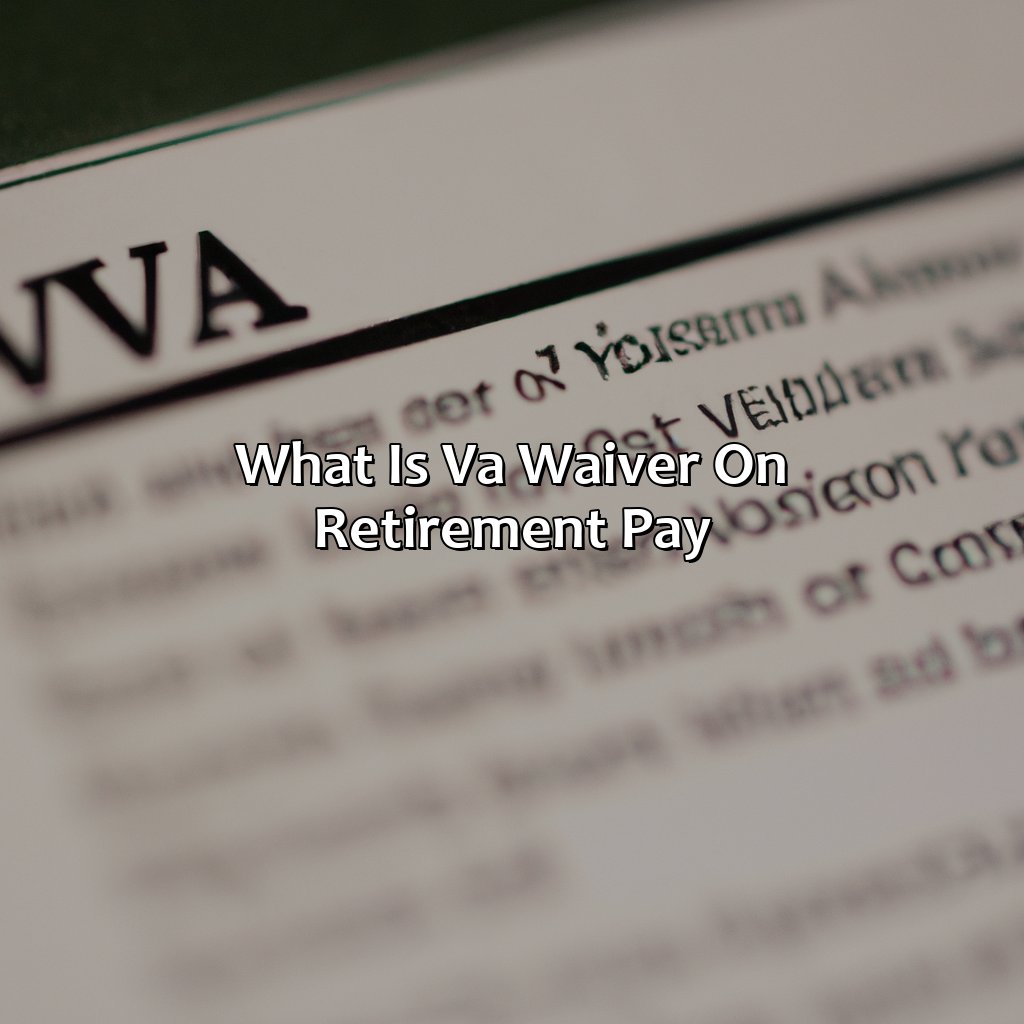What Is Va Waiver On Retirement Pay?
Key Takeaways:
- VA waiver on retirement pay refers to the option for military veterans to waive a portion of their retirement pay in exchange for tax-free disability compensation from the VA.
- To be eligible for a VA waiver on retirement pay, veterans must have a service-connected disability rated by the VA and be receiving military retirement pay.
- The process for applying for a VA waiver on retirement pay involves submitting VA Form 21-527EZ, which can be done online or by mail, and may take several months to process. It is important to consider the impact on both benefits and taxes before making a decision to waive retirement pay.
- The impact of a VA waiver on retirement pay may include changes to eligibility for other VA benefits, reductions in taxable income, and potential reductions in survivor benefits. However, it may also provide additional tax-free income for disabled veterans.
- The benefits of a VA waiver on retirement pay include increased tax-free income for disabled veterans and the ability for veterans to receive compensation for service-connected disabilities separately from retirement pay.
- Common questions and concerns about a VA waiver on retirement pay include how it may affect survivor benefits, eligibility for VA healthcare, and the process for appealing a decision on the waiver application.
Are you worried about the financial implications of retirement? Have you heard of VA Waivers and want to know more? In this article, you’ll learn everything you need to know about VA Waivers and how they could affect your retirement pay.
Definition of VA Waiver on Retirement Pay
In simple terms, VA Waiver on Retirement Pay means that military veterans must choose between their VA benefits and military retirement pay. The VA waiver reduces their retirement pay amount, and they receive an equal amount of benefit from the VA. This process ensures that veterans receive only one type of federal benefit and eliminating the possibility of double-dipping.
The VA waiver is required by law, and it applies to all military retirees who are eligible for both VA benefits and retirement pay. Once the VA waiver is in effect, the retiree receives a reduced retirement payment, the same amount as deposited directly to the retiree’s VA account.
It’s important to note that some exceptions exist to the VA waiver on Retirement Pay. Disabled military retirees who receive military retirement pay and service-connected VA compensation can receive both without the waiver. Furthermore, medical retirees are eligible to receive their full military retirement pay plus their VA disability benefits.
Interestingly, the VA waiver on Retirement Pay came about in the 1800s when retired soldiers were receiving multiple pensions from various sources. Congress passed laws to ensure that retired soldiers received only one pension, either from the federal government or their state. The VA waiver ensures that the same would be applicable to military retirees.
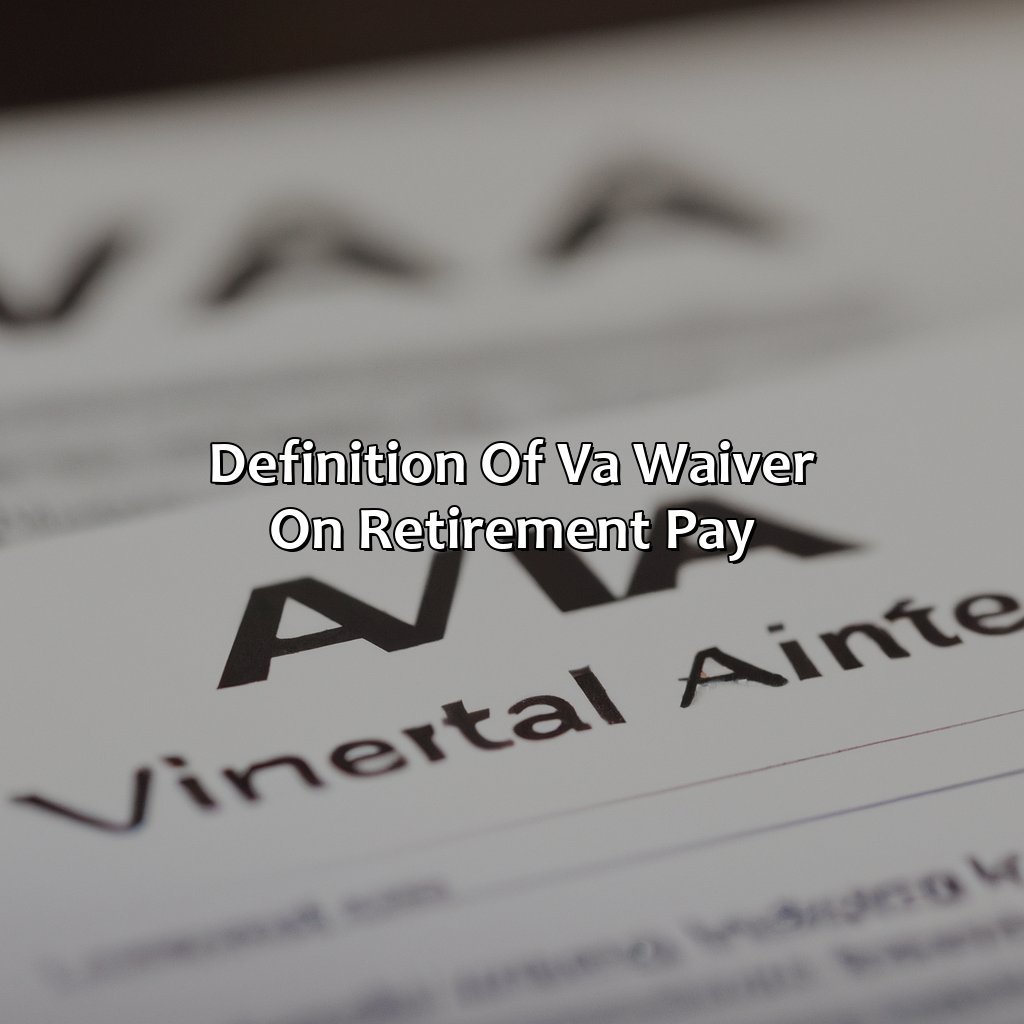
Image credits: retiregenz.com by James Duncun
Eligibility Criteria for VA Waiver on Retirement Pay
To qualify for the VA Waiver on Retirement Pay, veterans must meet specific eligibility requirements. These requirements may include being retired or eligible for retirement, displaying a disability rating of at least 50%, and waiving an equal amount of military retirement pay.
In addition, eligible veterans must have served for at least 20 years and received either a medical or regular retirement. Moreover, a qualified individual should not have a dishonorable discharge from service, should not have committed misconduct in service, and should have served in a qualifying period of conflict.
It is essential to note that married veterans who wish to qualify for the VA Waiver on Retirement Pay must have been married for at least one year before the armed services retirement date. In contrast, unmarried veterans may waive their retirement pay immediately.
Ensure that you do not miss out on this opportunity to receive financial assistance from the VA. Contact your local VA office and find out if you qualify for the VA Waiver on Retirement Pay today.
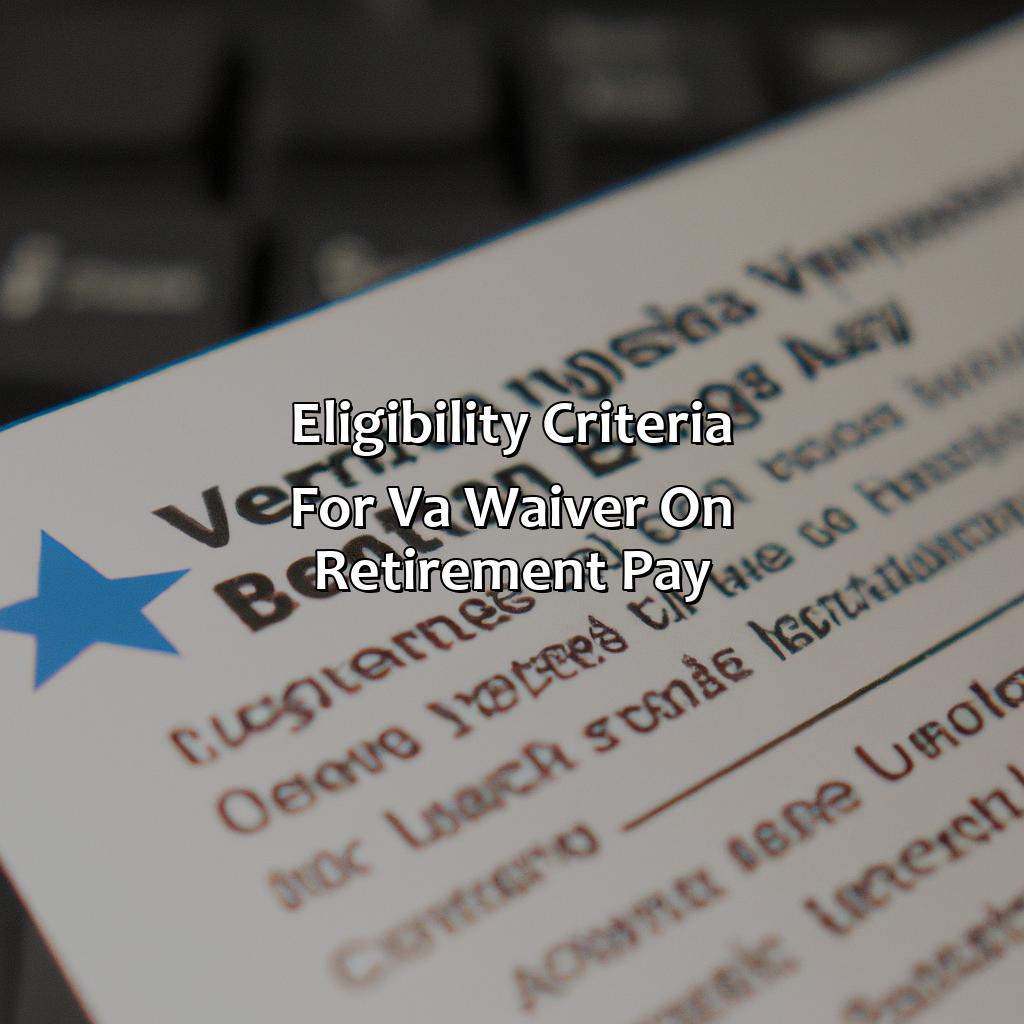
Image credits: retiregenz.com by Joel Woodhock
Process and Application for VA Waiver on Retirement Pay
Retirement pay can be affected by VA disability compensation. Here is a straightforward guide on how to apply for a VA waiver on retirement pay.
- Visit the VA website and fill out the appropriate form to apply for a waiver.
- Submit paperwork confirming your eligibility for VA disability compensation, as well as documentation of your retirement pay.
- Wait for the VA to process your application and notify you of their decision.
It is important to note that receiving a VA waiver on retirement pay may impact the amount of money you receive.
To ensure that you receive the benefits you deserve, it is important to stay up-to-date with the application process and deadlines. Don’t miss out on the opportunity to receive the maximum benefits available to you. Apply for a VA waiver on retirement pay today.
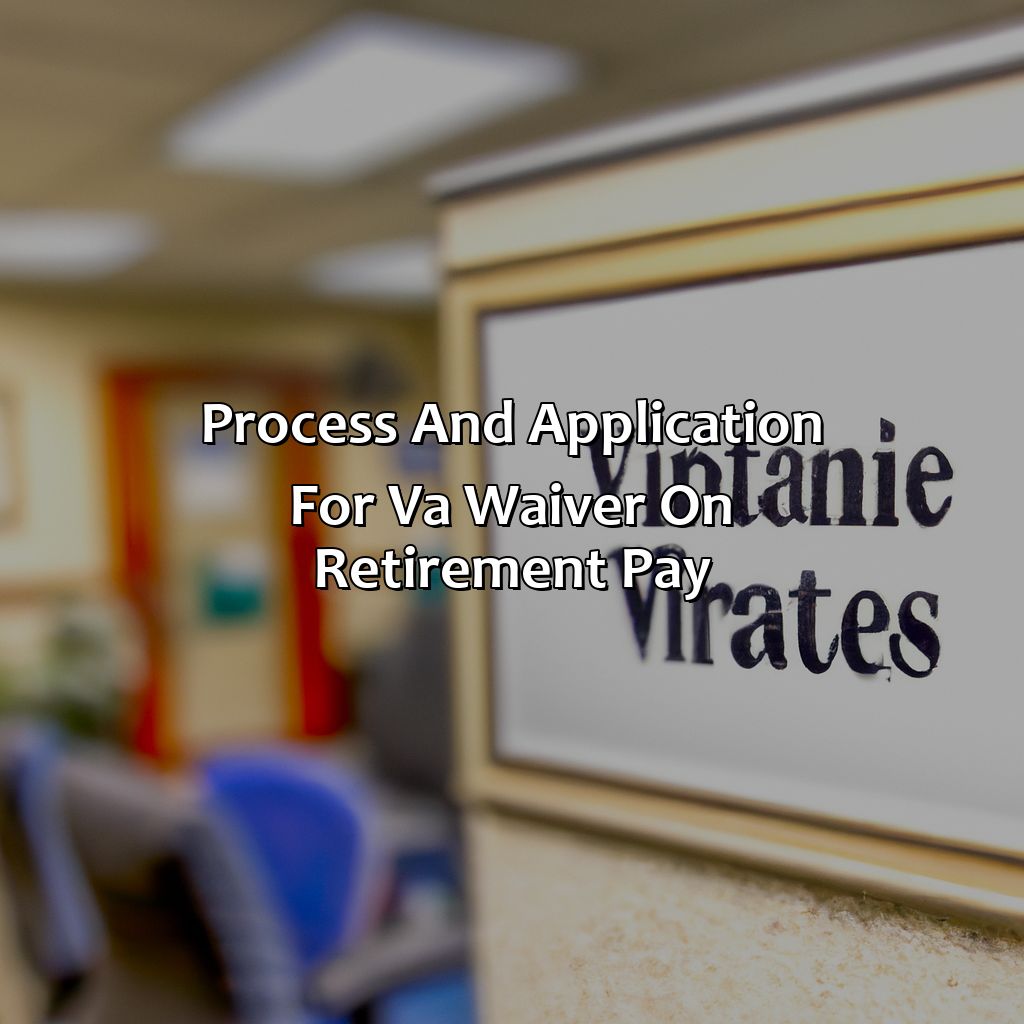
Image credits: retiregenz.com by Joel Duncun
Impact of VA Waiver on Retirement Pay on Benefits and Taxes
The VA waiver on retirement pay affects benefits and taxes for retirees. It is important to understand the impact of this waiver on one’s overall retirement income.
Retirees who receive VA disability compensation wave a portion of their retirement pay equal to the compensation amount. This can result in a reduction in retirement income but allows them to receive tax-free disability benefits. It is essential to consult with a financial advisor to determine the best course of action.
As per the ‘Department of Veterans Affairs’, an estimated 2.3 million veterans received disability compensation in 2020.
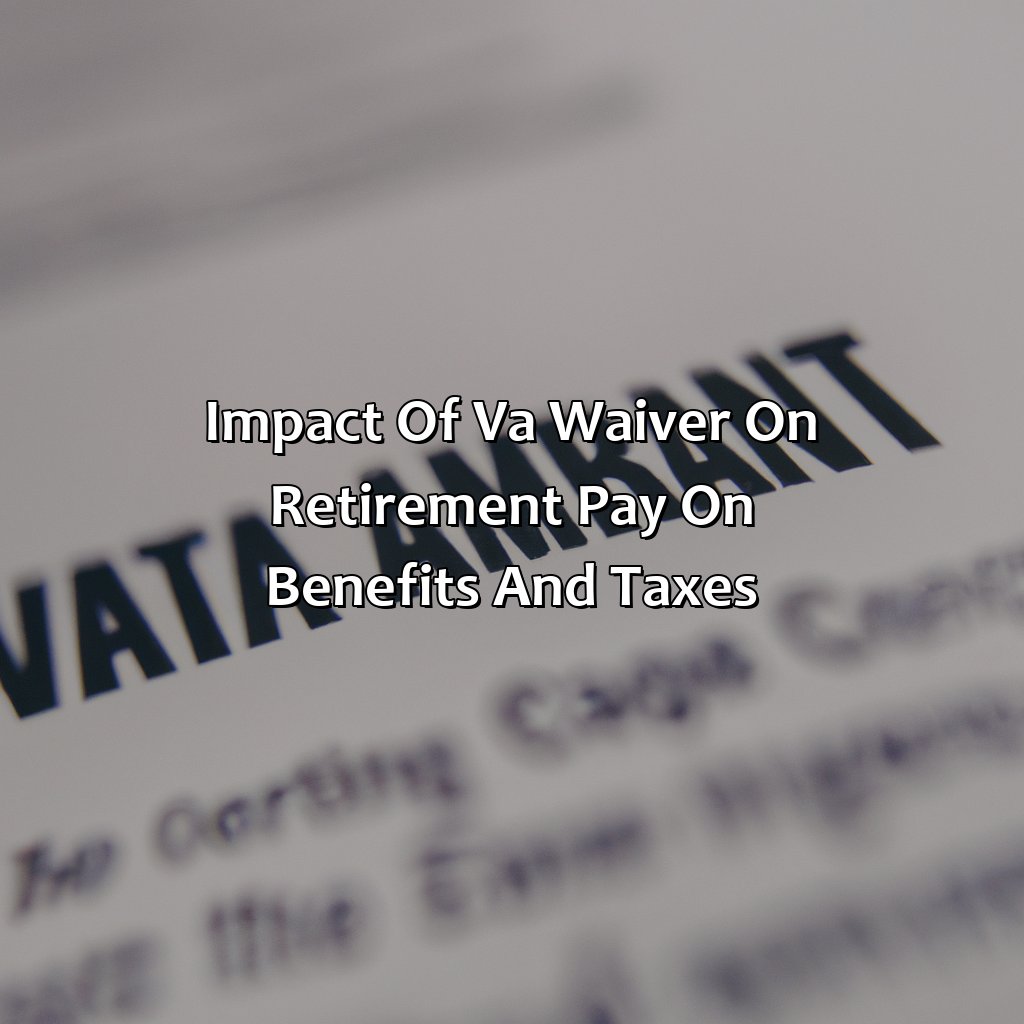
Image credits: retiregenz.com by Adam Woodhock
Benefits of VA Waiver on Retirement Pay
In this article, we will discuss the advantages of choosing a VA Waiver on your retirement pay. The VA waiver allows for VA disability compensation to replace retirement pay, which can result in additional financial benefits for veterans.
- Increased Financial Benefits: By opting for a VA waiver, veterans who were previously receiving a lower pension or retirement pay can receive additional financial benefits through VA disability compensation.
- No Offset: Unlike other forms of disability compensation, a VA waiver does not have an offset, meaning veterans can receive their full VA disability compensation in addition to their retirement pay.
- Tax-Free Benefit: VA disability compensation is tax-free, which can create a substantial advantage for veterans who have a VA waiver on their retirement pay.
- Access to Healthcare Benefits: VA disability compensation comes with access to healthcare benefits, which can provide veterans with necessary medical care.
- Annual Cost-of-Living Adjustments: VA disability compensation increases annually with a cost-of-living adjustment (COLA), which can help protect against inflation and provide financial security for veterans.
It is important to note that applying for a VA waiver can be a complex process, and veterans may want to consider seeking assistance from a VA-accredited representative. By getting help from an accredited representative, veterans can ensure that they are taking full advantage of their VA benefits and are receiving the maximum benefits available to them.
If you are a veteran who is eligible for a VA Waiver on Retirement Pay, it is essential to consider the benefits and potentially missed opportunities for additional compensation if you do not apply for it. Don’t miss out on the advantages that could be available to you by not considering a VA waiver.
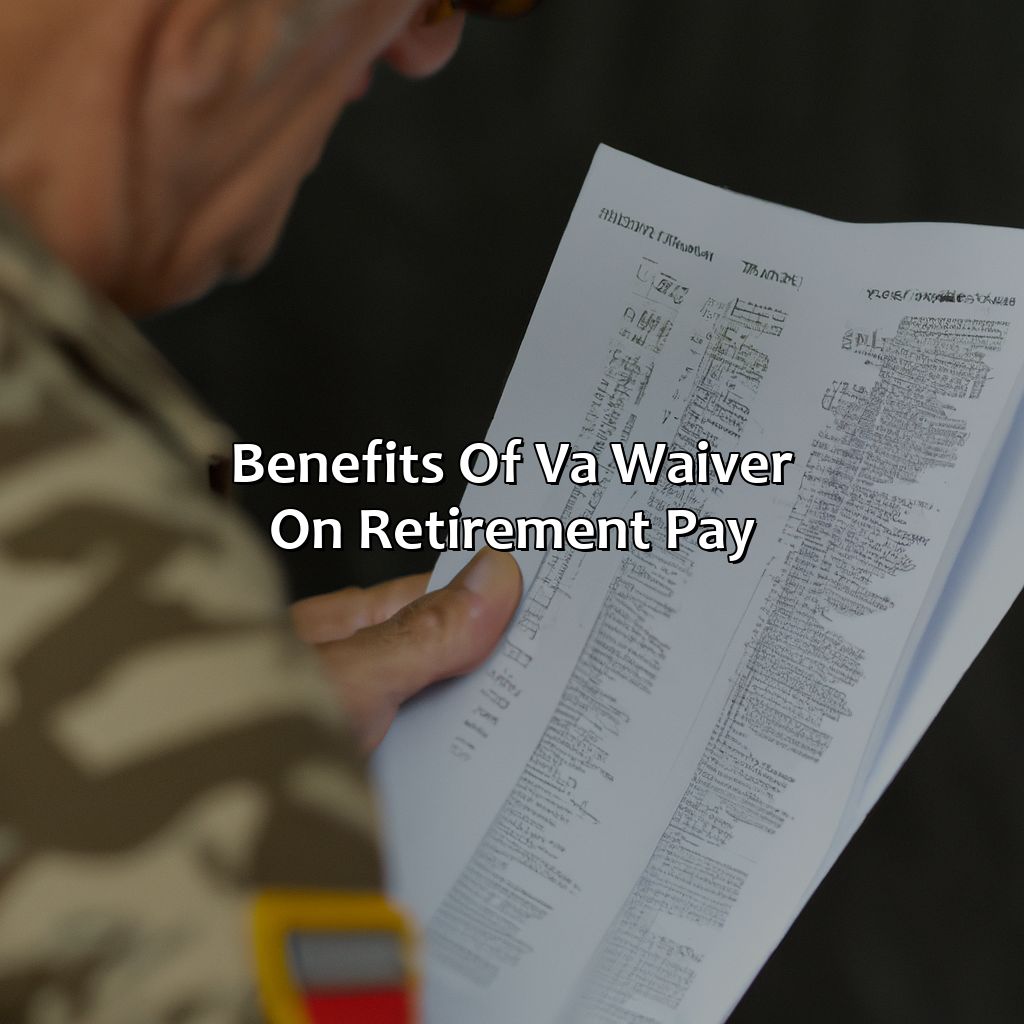
Image credits: retiregenz.com by Yuval Jones
Common Questions and Concerns about VA Waiver on Retirement Pay
Inquiries and concerns may arise about the VA Waiver on Retirement Pay. This waiver deducts a certain amount from the pay of military retirees who receive VA benefits. The purpose of this reduction is to make up for the amount of compensation paid by the VA.
It is necessary to note that the percentage of disability determined by the Department of Veteran Affairs dictates the amount of compensation received. Those receiving a disability compensation of 50% or higher are eligible for the VA Waiver.
The waiver only affects military retirees who are receiving both military retired pay and VA disability compensation. This often leads to confusion as those who receive disability compensation alone do not have any form of deduction.
In historical reference, the VA Waiver on Retirement Pay has undergone many changes throughout the years. However, its purpose remains the same – to equalize the amount of compensation received by military retirees receiving VA benefits.
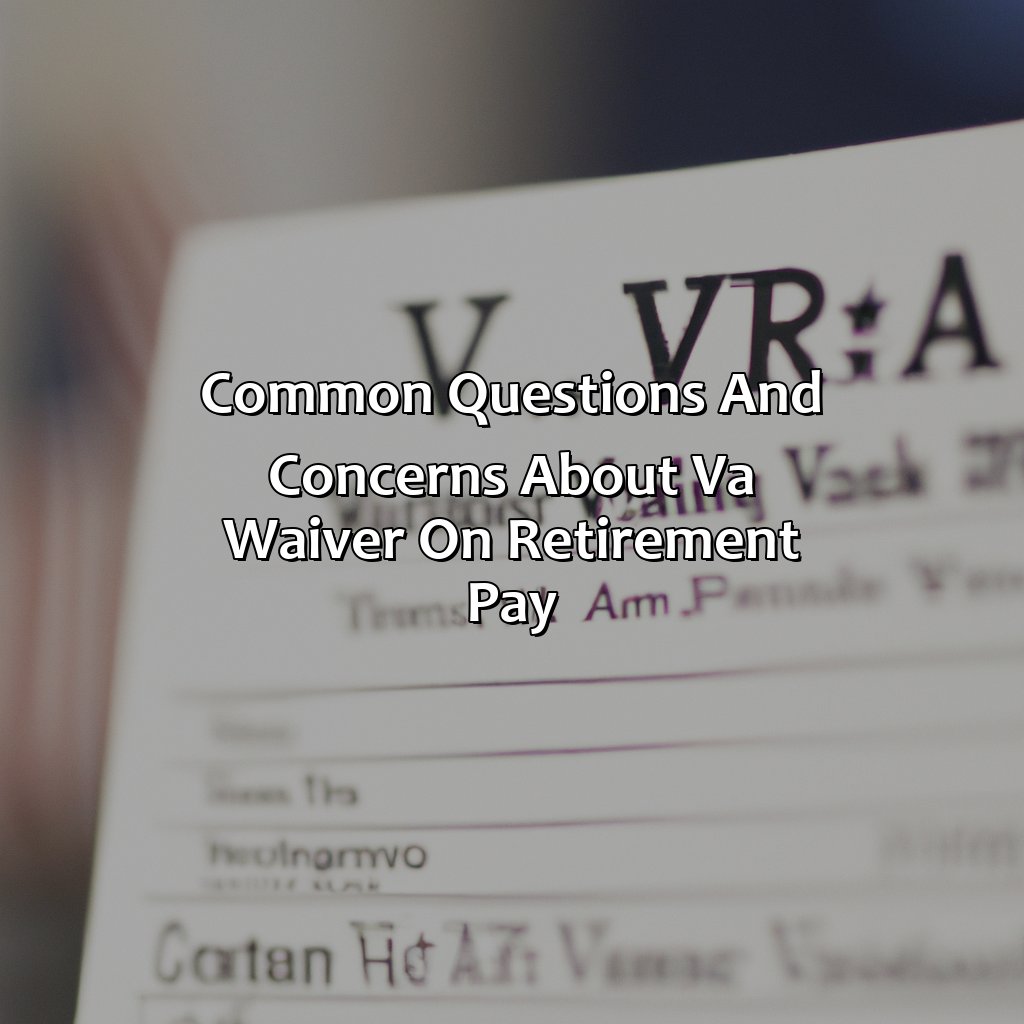
Image credits: retiregenz.com by David Washington
Five Facts About VA Waiver on Retirement Pay:
VA waiver on retirement pay is a benefit for veterans who have a service-connected disability rating of 50% or more. (Source: VA.gov)
The waiver exempts a portion of the veteran’s retirement pay from federal taxes. (Source: Military.com)
The waived portion of retirement pay is instead replaced by VA disability compensation, which is not taxable. (Source: USAA)
The percentage of waived retirement pay varies based on the veteran’s disability rating and length of service. (Source: Nolo)
VA waiver on retirement pay can be a significant financial benefit for eligible veterans and their families. (Source: DisabledVeterans.org)
FAQs about What Is Va Waiver On Retirement Pay?
What is VA Waiver on Retirement Pay?
VA waiver on retirement pay is a provision for military veterans who have a disability that is service-connected. The VA waiver allows veterans to receive both their retirement pay and disability compensation without reduction. This is to recognize the sacrifice and service of veterans who were disabled while serving in the military.
Who is Eligible for VA Waiver on Retirement Pay?
To be eligible for VA waiver on retirement pay, a veteran must have a disability that is service-connected. The disability must be rated at 50% or higher and the veteran must have at least 20 years of active military service. However, the years of service requirement can be lesser for veterans who were medically retired due to service-connected disabilities.
How Does VA Waiver on Retirement Pay Work?
VA waiver on retirement pay works by allowing eligible veterans to receive both their retirement pay and disability compensation without reduction. This means that veterans will receive their full retirement pay as well as their full disability compensation. This is to recognize the sacrifice and service of veterans who were disabled while serving in the military, and to ensure that they receive the full benefits they are entitled to.
Is VA Waiver on Retirement Pay Taxable?
No, VA waiver on retirement pay is not taxable. This means that eligible veterans will receive their full retirement pay and disability compensation without any reduction due to taxes. However, other types of disability compensation may be taxable, so veterans should consult with a tax professional for specific advice.
How Do I Apply for VA Waiver on Retirement Pay?
To apply for VA waiver on retirement pay, veterans should submit a VA Form 21-526, Veterans Application for Compensation and/or Pension, to the Department of Veterans Affairs. This form should include supporting documentation such as medical records and service records. Veterans may also seek assistance from a Veterans Service Officer or other authorized representative to help them with the application process.
What Other Benefits are Available to Veterans with a VA Waiver on Retirement Pay?
Veterans with a VA waiver on retirement pay may be eligible for other benefits such as healthcare, vocational rehabilitation, and education assistance. They may also be eligible for state and federal tax breaks on property taxes, sales taxes, and income taxes, as well as discounts on goods and services from certain businesses.
 Checkout this IRS Loophole
Checkout this IRS Loophole 
